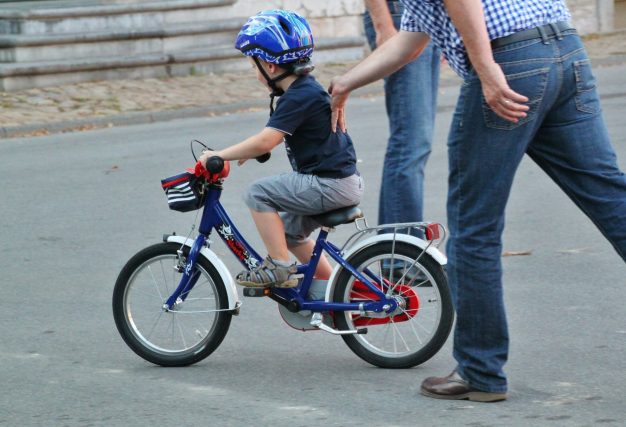
Denmark gets 10 permanent bicycle playgrounds
In Canada and the United States there is no comprehensive, consistent bike education programs, however a number of initiatives are underway to determine how to introduce a comprehensive system. However, European children benefit from a strong bicycle education culture. In 2015, the Danish Cyclists’ Federation was granted funds to co-finance the construction of 10 permanent bicycle playgrounds around Denmark over the next three years.
“This project is a major breakthrough for children’s cycling in Denmark. Through cycling games, children get a solid foundation for becoming active and traffic safe cyclists in their childhood, youth, and adulthood. In other words, cycling games helps secure and develop the unique Danish bicycle culture,” says Klaus Bondam, CEO of the Danish Cyclists’ Federation.”
Bicycle education
In busy, urban environments, parents often worry about where children can safely practice biking. Several researchers have found that parents in Western countries are reluctant to allow their children to bike to school because of safety reasons and more children are getting driven to school than ever before. However, European children benefit from a strong bicycle education culture, with some countries even integrating bicycle education throughout a child’s development. Children introduced to bicycle education programs not only learn bike safety, they also benefit through improved health and school performance and introducing cycling as a transportation choice to children, can positively impact environmental sustainability.
Children’s Health
Biking to school contributes to a higher level of physical activity including bone, muscle and joint health; weight and blood pressure control; and reduction in the risk of diabetes. Driving a child from home to school limits the child’s opportunities to interact with their neighbourhood and other children and this can negatively impact their social behaviour development.
Children’s School Performance
A 2012 study by researchers from the University of Copenhagen and Aarhus University followed 20,000 school kids aged 5-19 in some of their daily activities. The study showed that children who walked or biked to school concentrated better than those driven to school or taking public transport, and the effect lasted throughout the morning hours. And, a 2011 research study funded by the Spanish National Research Council, demonstrated that teen girls who walked or biked to school performed better at school in verbal and math skills that their peers who rode the bus or got to school in a car.
Environmental Sustainability
Emerging research suggests young people have an overwhelmingly positive disposition towards cycling and comprehensive and effective bicycle education programs can influence their future transportation decisions. Bicycle education programs will help children choose bicycles as a clean, accessible and efficient transportation choice, creating the potential for a significant shift in environmental sustainability.
Author: Helen Davidson
References:
https://engage.gov.bc.ca/climateleadership/files/2015/12/096_-BC-Bike-Right-Network.pdf
http://www.treehugger.com/bikes/bike-school-better-grades.html
http://sciencenordic.com/children-who-walk-school-concentrate-better
http://tram.mcgill.ca/Research/Publications/Cycliste%20averti.pdf
http://www.treehugger.com/bikes/bike-school-better-grades.html




